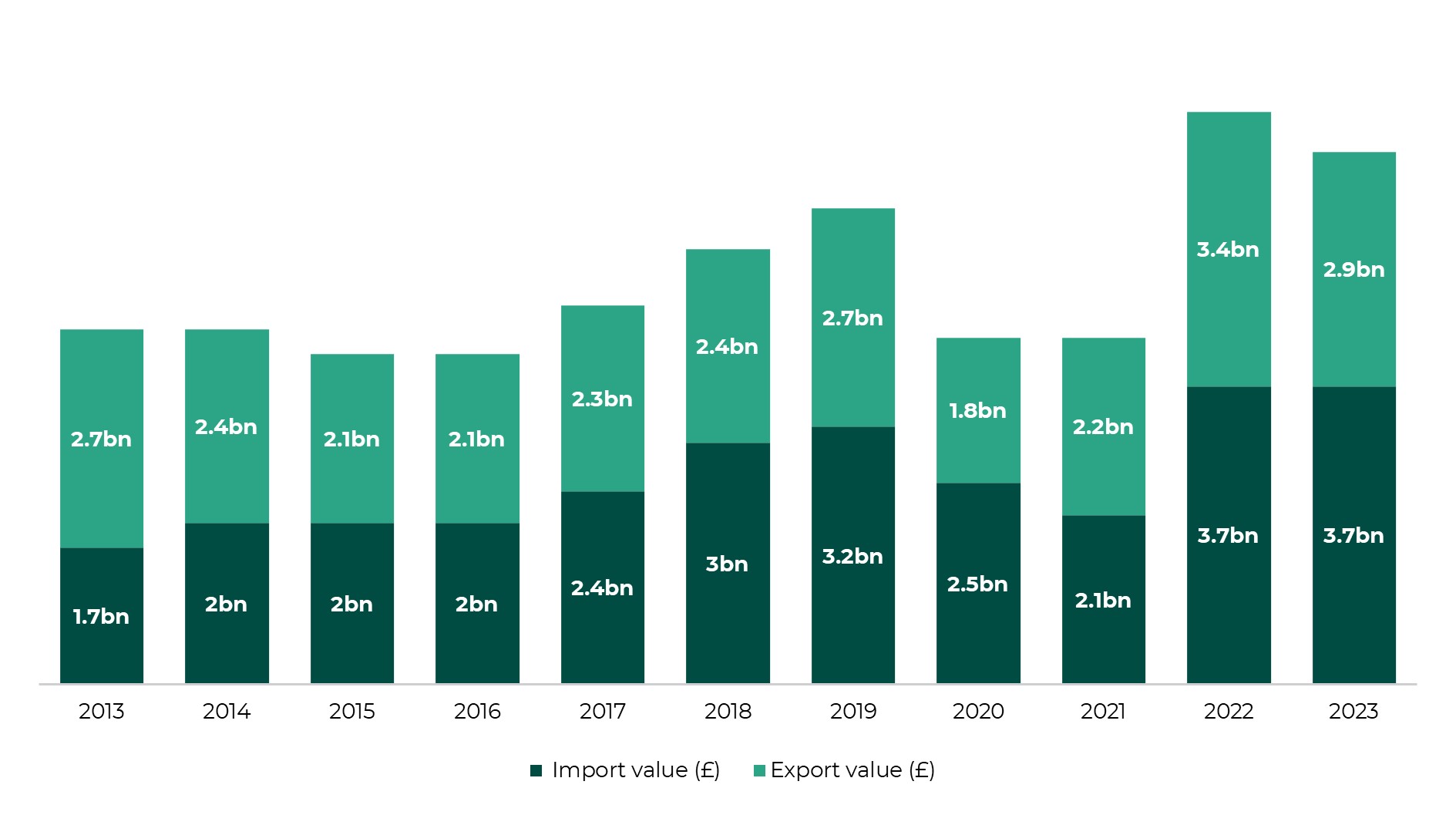The US is one of Wales’s biggest trading partners, and the Welsh Government has been trying to strengthen this relationship, including through its International Strategy. The US is also one of the Welsh Government’s priority target markets under the Strategy’s corresponding Export Action Plan.
With the current focus on US trade policy, this article outlines its potential effects on Wales and the latest Wales-US trade statistics.
Wales-US trade
According to Welsh Government analysis, the US was Wales’s highest value trading partner by country in 2023 (the EU remains Wales’s largest trading partner overall)
Figure 1 below shows the value of imports and exports between Wales and the US over a 10 year period.
Figure 1: Wales-US trade by value (2013-2023)

Source: Welsh Government International goods trade - interactive dashboard
Wales’s biggest export to the US in 2023 was machinery and transport equipment, which accounted for 5.3% of Wales’s exports. Its biggest import was mineral fuels, lubricants and other materials, which accounted for 8.1% of Wales’s imports.
In a press release, the Welsh Government said the US has “consistently” been Wales’s largest inward investment donor in the same 10-year period and that:
in 2022 to 2023, Wales secured 14 investments from the USA, promising to create 836 new jobs and to safeguard a further 537 jobs.
The First Minister, Eluned Morgan MS, spoke of the significance of the US as a trading partner on 21 January 2025, following President Trump’s inauguration, saying that:
I think it is important for us to recognise that there are 40,000 people in Wales who work for US companies, so maintaining a relationship with the United States is critical for them. It counts also for 14 per cent of our exports and is the largest inward investor in Wales. So, keeping a relationship with one of the most powerful countries in the world, I think, is important, irrespective of who is running the country.
US tariffs
On the potential imposition of US tariffs, the First Minister said they would be “very harmful to our businesses in Wales” and would “inevitably lead to job losses”.
The First Minister said she planned to meet with the new UK ambassador to the US, who she said would “make the case for how important a market the United States is for Wales […] and that we can also encourage exports, ideally without a tariff”. Lord Peter Mandelson was appointed as the UK’s ambassador to the US in December 2024.
Since taking office, President Trump has announced tariffs on imports from Canada, China and Mexico. The three countries initially proposed to retaliate through their own tariffs. Mexico and Canada reached agreements with the US to pause implementation for 30-days. China’s already imposed some tariffs on US imports, and has filed a complaint with the WTO. However, the WTO has not been able to hear legal cases since 2019 when the US blocked the appointment of judges onto its appellate body.
President Trump announced a 25% tariff on all steel and aluminium entering the US on 10 February. On 13 February, he announced a new Fair and Reciprocal Plan to “counter non-reciprocal trading arrangements with trading partners by determining the equivalent of a reciprocal tariff with respect to each foreign trading partner”. The BBC has reported that President Trump’s team will present the plan to him by 1 April for his consideration. The European Commission responded to the announcement, calling it a “step in the wrong direction”. It said it believed in “mutually beneficial and balanced” trade partnerships and will “react firmly” to “unjustified barriers to free and fair trade”.
There is currently no clarity on whether the US will impose tariffs on the UK. President Trump has spoken publicly of the prospect, saying the UK is “way out of line” but issues can be “worked out”.
Tariffs imposed between the US and its biggest trading partners could still have an impact in the UK, with a BBC report citing estimates that the tariffs on Mexico and Canada could reduce UK GDP growth by 0.1 percentage points in 2025. This is because UK exports to those countries could become more expensive if their currencies were to decline. The report also suggests that “industrial exports could be diverted from the US and flood the UK market”.
EU tariffs
President Trump has previously suggested imposing tariffs on the EU. The bloc is Wales’s largest trading partner, accounting for 59.5% of Welsh goods exports in 2023 (by comparison, exports to the US accounted for 15.1%). Any economic impacts of tariffs on the EU’s economy could have similar effects on the UK economy to those described above regarding Canada and Mexico.
The island of Ireland will be another consideration for the UK Government should President Trump pursue tariffs against the EU. Under the Windsor Framework, Northern Ireland applies the EU’s customs code and would have to apply a retaliatory EU tariff on US goods, while the UK may not have to.
The Senedd’s Culture Committee reported on Wales-Ireland relations in October 2023, and Senedd Research published an article on Wales and the Windsor Framework.
Balancing EU and US trade
The Prime Minister, Keir Starmer MP, has been seeking to re-set the relationship with the EU since he took office. UK Government priorities include an SPS/veterinary agreement which may require greater regulatory alignment between the UK and the EU. Commentators have questioned whether the EU would conclude an SPS/veterinary agreement with the UK if the UK also seeks a US trade deal that would allow the import of US goods to the UK with different regulatory standards. UK in a Changing Europe has commented that:
agreeing to relax restrictions on, say, the import of cheap American food would be unpopular at home. It would also scupper any chances of the veterinary deal with the EU that forms part of Starmer’s much-vaunted ‘reset’.
The Prime Minister has been questioned on the tension created should the UK attempt to forge closer trading relations with both the EU and the US and said the UK is “not choosing between the US and the EU”. The former UK Government had started negotiations around a ‘foundational’ trade partnership with the US, under President Joe Biden. These were “shelved” and there is no indication on whether they will restart under President Trump.
Conclusion
Further news on tariffs is likely as President Trump is yet to make final decisions on the EU and the UK. But with the prospect of tariffs looming for several countries, the UK and Wales could feel the impact of US trade policy, even if it is indirectly. The potential trade war brewing between the US and the EU, also leaves the UK navigating complex terrain as it tries to balance the demands of two different trading partners. Given the significance of the US market to Wales, this is likely to be a key issue for some time.
Article by Madelaine Phillips, Senedd Research, Welsh Parliament






